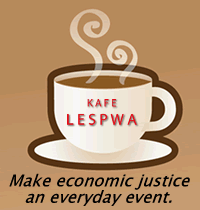Note: His Lenten prayer services on Thursday evenings at St. James the Less will still continue.
* * *
Dale likes to drink a lot of milk. It was customary to have a few gallons stockpiled in the fridge each week. With him gone, it is amazing how slowly the milk levels have been falling. There was this one full gallon in particular that was just zooming toward its expiration date and there was just no way we were even going to come close to touching it. I put the word out and asked around.
So I was cooking yesterday and someone came to the door asking about the St. Vincent de Paul food pantry. He came to the wrong door or else I never would have known he was there. I told him the pantry was probably closed, but I would try to help him. It turns out that Jake and Harry had stayed late and had items ready for him. I heard the man ask if they had any powdered milk (I supposed powered is usually what they carry in most pantries). He was thankful for his groceries, but mentioned milk a couple of times.
At the time my brain didn't exactly put it all together. I had forgotten about the extra milk jug we had. As he was leaving, he seemed to linger around just a little bit--perhaps just long enough to make the connection. I remembered the milk and handed him the jug as he was headed toward the car. He was quite happy.
It's a simple story perhaps, but I believe it illustrates God's economy. This is how it works: You sit around wondering what you are going to do with all this milk, and soon enough someone comes to your door asking for milk. You wonder how everyone is going to be fed, and when it's all said and done there are actually leftovers. This is why Dorothy Day entitled her book about the Catholic Worker movement "Loaves & Fishes." She no doubt saw multitudes fed every day, starting out with just a few scant items, just like in the Gospel stories.
 There is another economy that Wall Street executives may never know about but in which your local food pantry may thrive. Items are shared, people are fed, things shuffle around between groups. The right items seem to arrive at the right times. Miracles happen every day.
There is another economy that Wall Street executives may never know about but in which your local food pantry may thrive. Items are shared, people are fed, things shuffle around between groups. The right items seem to arrive at the right times. Miracles happen every day.This is why we don't charge for our services. When we host retreats and workshops, we are open to donations but we don't make them a requirement for services rendered. We try to minimize the connection between their involvement with our community and a payment. The Lord works it out. Putting a price tag on those services is like saying we don't trust the Lord, like somehow we have to control the process in order to get our needs met.
Not charging allows struggling groups to get by with less and offers wealthier groups the chance to give more. People can give--or not give--however they are inspired. It allows the personal relationship to come first without being dictated by business terms. I can actually feel the change in energy that happens once money becomes an expectation in the relationship--it is like a wall goes up between me and the other person. The Catholic Worker value of personalism challenges us to always put people before money, relationship before things and trust before fear.





1 comment:
Dear Frank I stumbled upon your blog when I typed how to
wish someone well in the Catholic religion.
I was expecting a prayer in Latin but ur Catholic Worker
blog cropped up. I read the blogpost about Brother Dale and what you wrote about God's economy. I was impressed by the message contained in your words. Well done. Dr BS
Post a Comment